In: thinking, logic, knowledge.
Backlinks: Conspiracy-theory, Logic, Paradox, Skepticism, Statistics.
Truth
Humanity's greatest fear is that the Truth is Absolute.
Your opinion is not the Truth.
To agree with all ideas is the ultimate acceptance of relative Truth.
Knowing the Absolute Truth is not intolerant.
Without Absolute Truth, there are no standards.
Observe. Don't absorb.
Truth doesn't usually come knocking at your door. You have to go find it.
All human truths are relative. Relative in time, relative to each culture, relative to each individual, relative in each context: work, family, friends…
Of course, to claim that this paragraph is absolutely true, would also mean to deny it.
We are in the age of misinformation, misinterpretation, ignorance and confusion.
Searching for truth is very much like digging for gold: precious and very hard to find.
Gallery
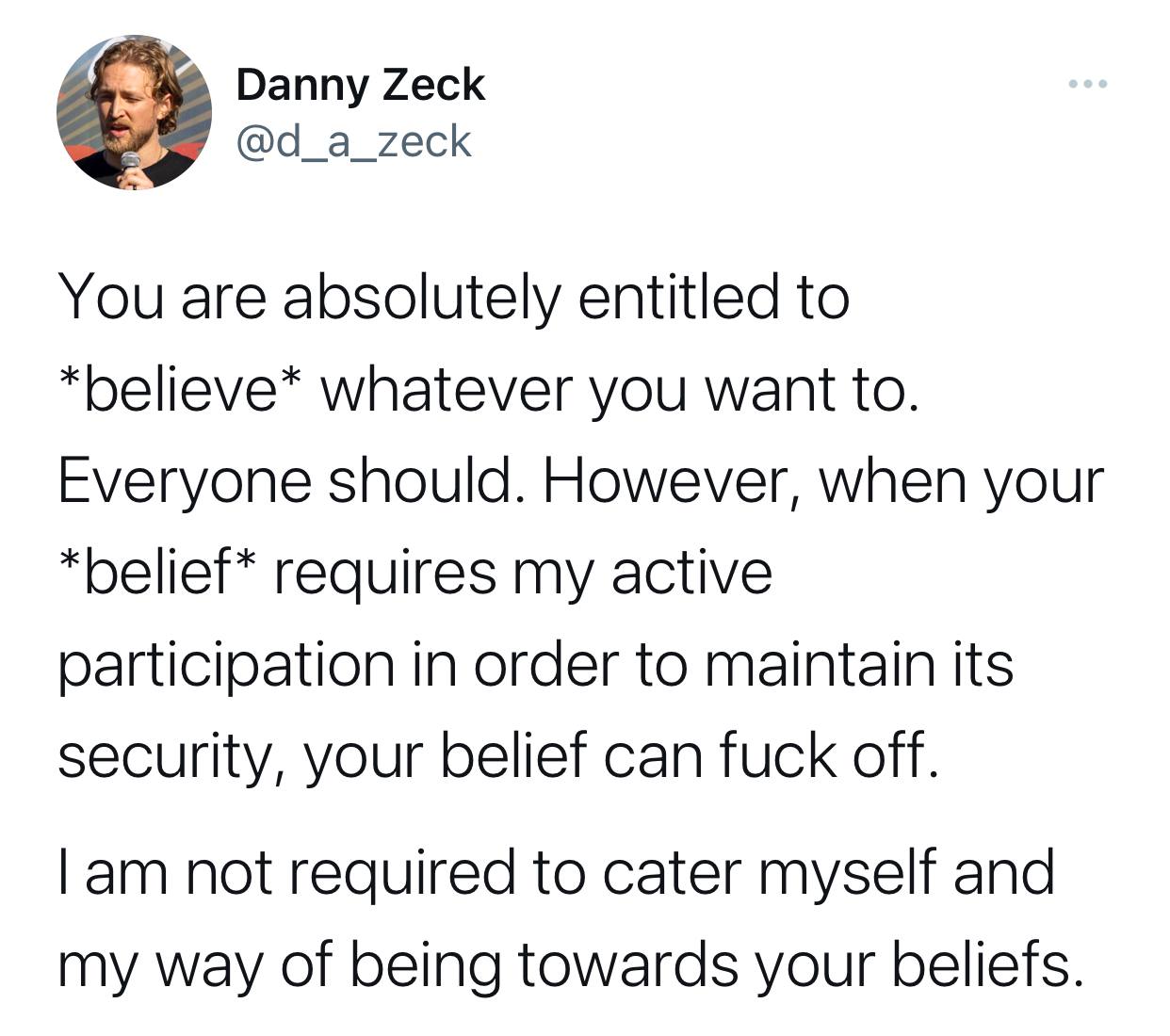
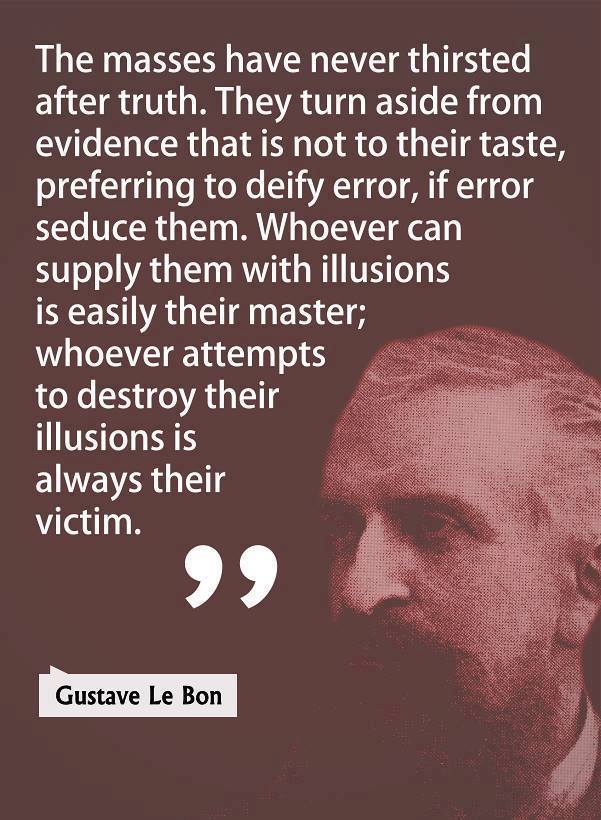
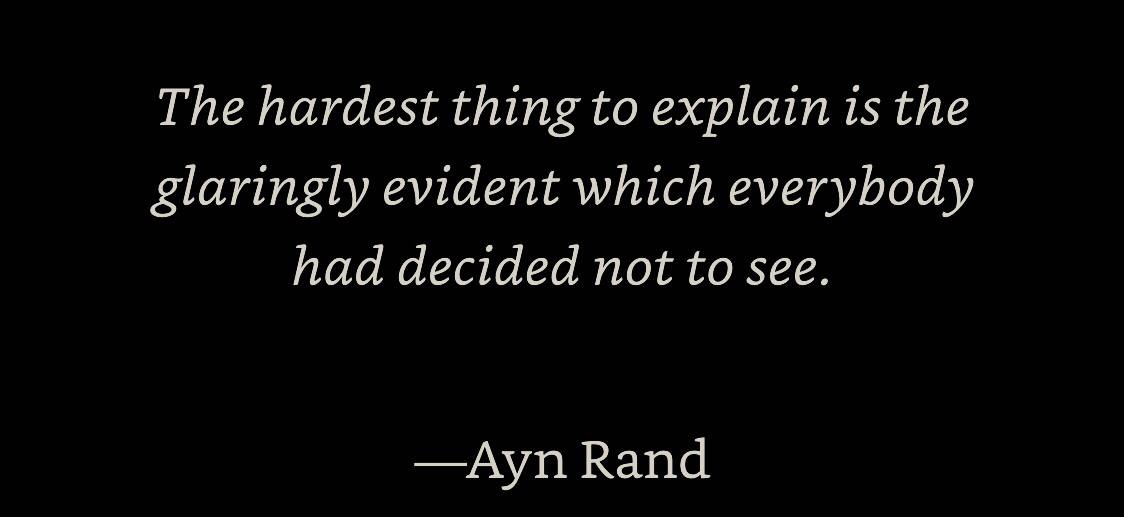
Quotes
TRUTH does not mind being questioned. A LIE does not like being challenged.
How can you tell the Truth is being told?
- when Facebook blocks
- Twitter deletes it
- Google hides it
- YouTube bans it
- The Government forbits it
- and Mainstream Media brands it as Conspiracy-Theory
We are facing a generation of emotionally weak people, where everything has to be softened. Because "everything" is offensive… including the Truth.
– unknown
The strength of a person's spirit would then be measured by how much 'Truth' he could tolerate, or more precisely, to what extent he needs to have it diluted, disguised, sweetened, muted, falsified.
– Friedrich Nietzsche, Beyond Good and Evil
Truth is a pathless land and you cannot approach it by any path whatsoever, by any religion, by any sect. Truth, being limitless, unconditioned, unapproachable by any path whatsoever, cannot be organized; nor should any organization be formed to lead or to coerce people along any particular path. My only concern is to set humanity absolutely, unconditionally free. Man cannot come to it through any organization, through any creed, through any dogma, priest or ritual, not through any philosophic knowledge or psychological technique. He has to find it through the understanding of the contents of his own mind, through observation and not through intellectual analysis or introspective dissection.
– Jiddu Krishnamurti
Most men occasionally stumble over the truth but they pick themselves up and continue on as if nothing ever happened.
– Winston Churchill
Only the small secrets need to be protected. The big ones are kept secret by public incredulity.
– Marshall McCluhan
Most of the greatest evils that man has inflicted upon man have come through people feeling quite certain about something which, in fact, was false.
– Bertrand Russell
Truth resides in every human heart, and one has to search for it there, and to be guided by truth as one sees it. But no one has a right to coerce others to act according to his own view of truth.
– Mahatma Mohandas K. Gandhi
They deem him their worst enemy who tells them the truth.
– Plato
Unthinking respect for authority is the greatest enemy of truth.
– Albert Einstein
Everything we hear is an opinion, not a fact. Everything we see is perspective, not the truth.
– Marcus Aurelius
The greatest deception men suffer is their own opinions.
– Leonardo da Vinci
There are no facts, only interpretations. – Nietzsche
The reason why most people are frustrated is because a lie cannot be turned into a truth.
– Vernon Howard
Opinion is the medium between knowledge and ignorance.
– Plato
Only by the painstaking elimination of the untrue, does one find the Truth.
– Sir Arthur Conan Doyle
Because it is sometimes so unbelievable, the truth often escapes being known. – Heraclitus
Truth, she thought. As terrible as death. But harder to find.
– Philip K. Dick, The Man in the High Castle
Ah yes, truth. Funny how everyone is always asking for it but when they get it they don't believe it because it's not the truth they want to hear.
– Helena Cassadine
The truth that makes men free is for the most part the truth which men prefer not to hear.
– Herbert Sebastien Agar
And so the truth does set you free, but the problem is that it destroys everything that isn't worthy in you, as it sets you free and that's a process of burning.
And it's painful, because you cling to what you shouldn't be, partly out of pride and partly out of ignorance and partly out of laziness.
And then you encounter something true… and you all know this, because when was the last time you learned something important that wasn't a blow of some sort?
And often you look back at your life and you think, oh God, I really learned something there, I wouldn't want to do that again, but it really changed my life.
– Dr. Jordan B. Peterson, THE TRUTH
Without seeking, truth cannot be known at all. It can neither be declared from pulpits, nor set down in articles, nor in any wise prepared and sold in packages ready for use. Truth must be ground for every man by itself out of it such, with such help as he can get, indeed, but not without stern labor of his own.
– John Ruskin
How can you tell Truth has been told?
When Facebook deletes it
Twitter deletes it
Google hides it
YouTube bans it
Your govt forbits it
And media brands it as conspiracy theory
– Eric Moutsos https://t.me/ericmoutsos/3441
When you tear out a man's tongue, you are not proving him a liar, you're only telling the world that you fear what he might say.
– George R.R. Martin, A Clash of Kings
Withholding information is the essence of tyranny. Control of the flow of information is the tool of the dictatorship.
– Bruce Coville
A false path must be tensely and angrily defended by those it has deceived.
– Vernon Howard
When I tell the truth, it is not for the sake of convincing those who do not know it, but for the sake of defending those that do.
– William Blake
The trust of the innocent is the liar's most useful tool.
– Stephen King
Censorship is the child of fear and the father of ignorance.
– Laurie Halse Anderson, Speak
If all printers were determined not to print anything till they were sure it would offend nobody, there would be very little printed.
– Benjamin Franklin
It's now very common to hear people say, 'I'm rather offended by that.' As if that gives them certain rights. It's actually nothing more… than a whine. 'I find that offensive.' It has no meaning; it has no purpose; it has no reason to be respected as a phrase. 'I am offended by that.' Well, so fucking what.
– Stephen Fry, I saw hate in a graveyard, The Guardian, 5 June 2005
Who is more to be pitied, a writer bound and gagged by policemen, or one living in perfect freedom who has nothing more to say?
– Kurt Vonnegut
Censorship is telling a man he can't have a steak just because a baby can't chew it.
– Mark Twain
I swore never to be silent whenever human beings endure suffering and humiliation. We must always take sides. Neutrality helps the oppressor, never the victim. Silence encourages the tormentor, never the tormented.
– Elie Weisel
But you can't make people listen. They have to come round in their own time, wondering what happened and why the world blew up around them.
-- Ray Bradbury, Fahrenheit 451
Gallery
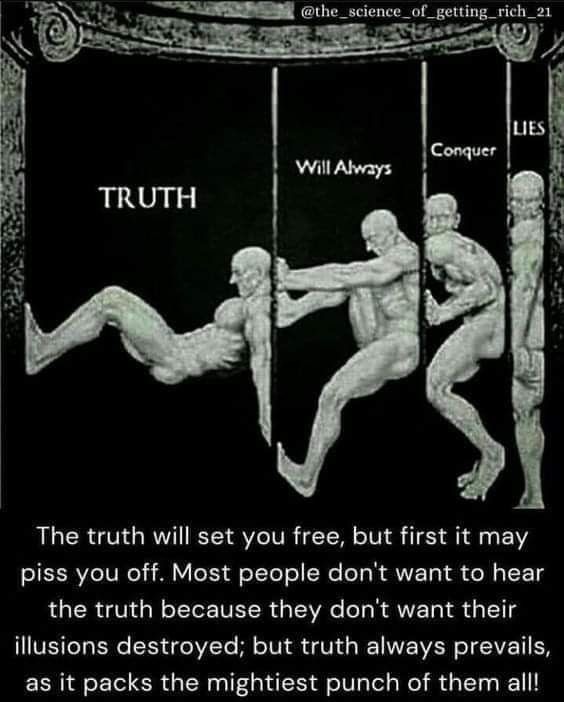
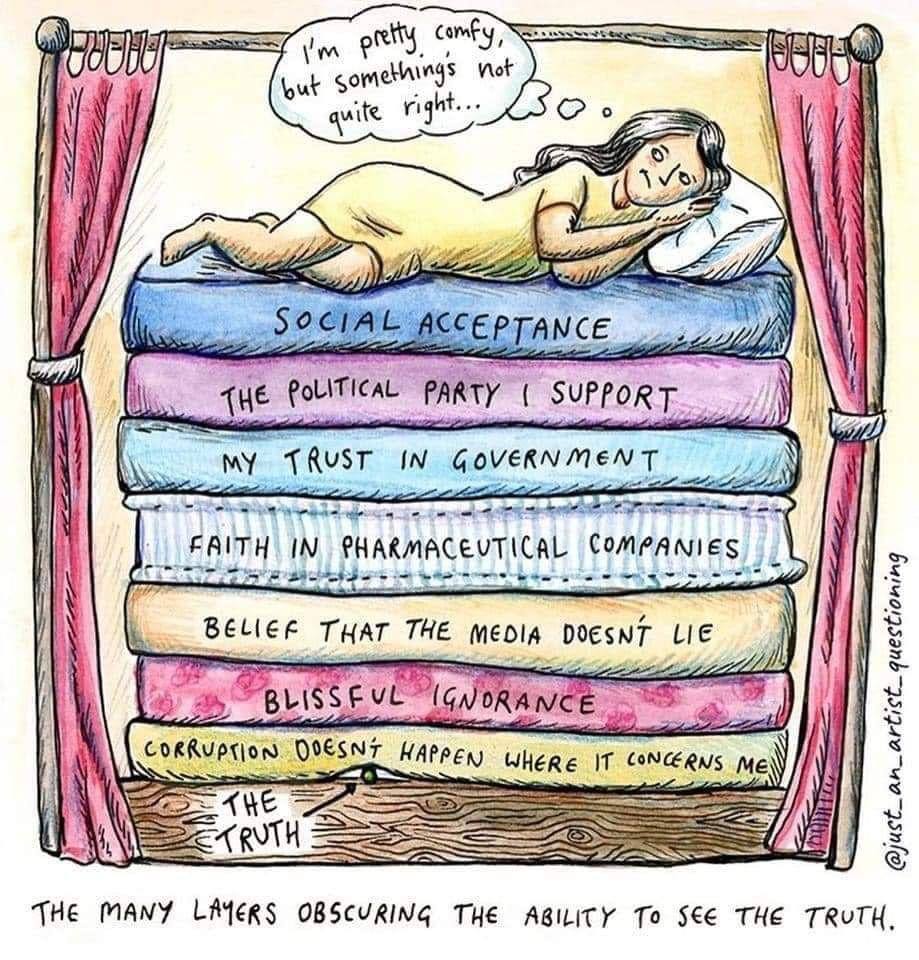
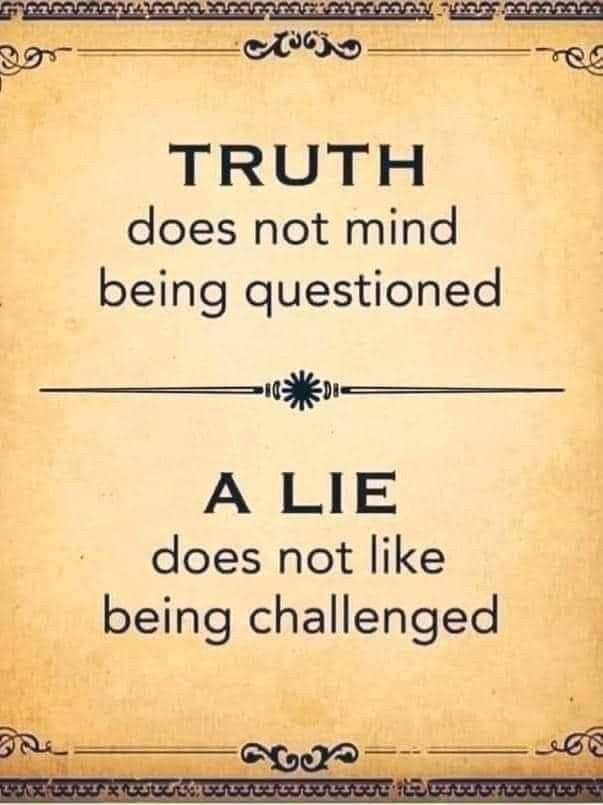
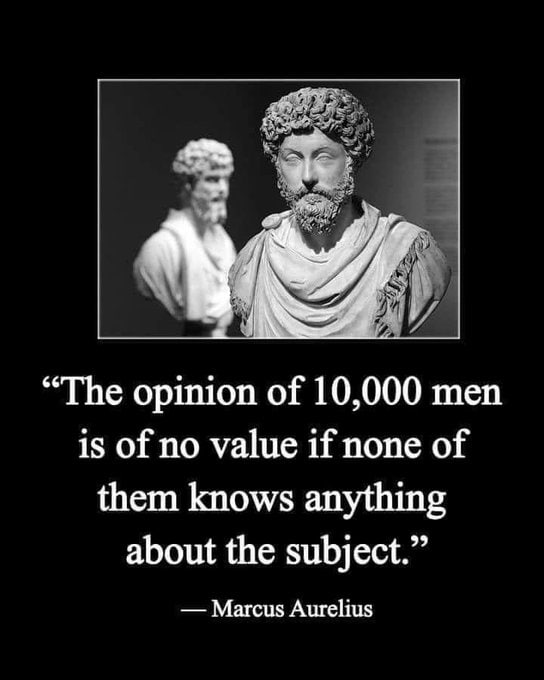
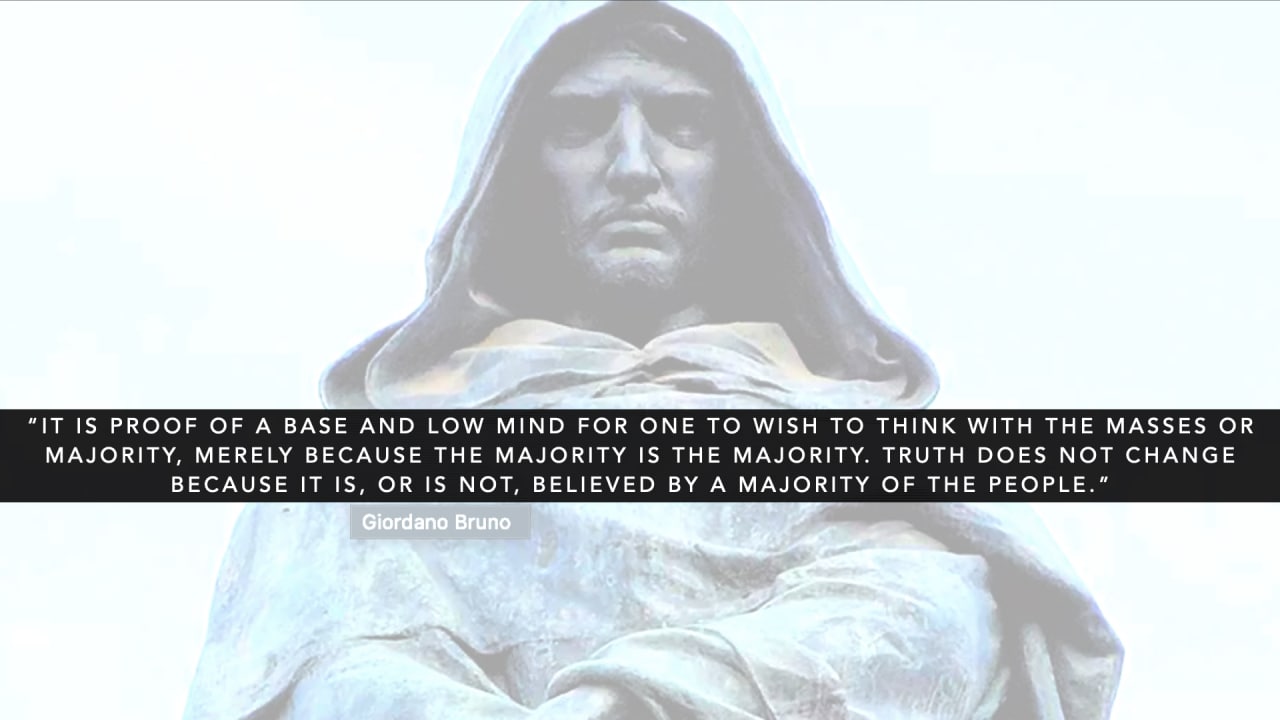
Video
The truth - One of the greatest speeches ever - Jordan Peterson Motivation
https://youtube.com/watch?v=7R-FUA0ZBJc
Articles
Is truth relative or absolute?
https://evidenceandanswers.org/article/truth-absolute-or-relative
Truth that is defined as being absolute, possesses the following qualities:
- Truth is discovered not invented
- Truth is transcultural: it can be conveyed across different cultures
- Truth is unchanging: it can be conveyed across time
- Beliefs cannot change a truth statement no matter how sincere one may be
- Truth is unaffected by the attitude of the one professing it
- All Truths are absolute
- Truth is knowable
The popular view on truth in our culture today is that objective, universal and absolute truth is implausible. They believe:
- Truth is created not discovered. Truth is a matter of perspective and each culture or individual defines for themselves what is truth.
- Since truth is invented, there is no universal transcultural truth. Each culture or individual will define truth differently according to their background and perspective.
- Truth changes. Since it is inseparably connected to individuals and cultures which continually change, truth perpetually to changes.
- Since truth is a matter of a group or individual's perspective, one's beliefs can change a truth statement.
- Since an individual determines truth, truth is affected by the attitude of the one professing it.
- There can be no such thing as absolute truth.
- Absolute truth is not knowable. Absolute and objective truth cannot be known since it is built on the shifting foundation of man's perceptions. As each individual's perception is different, truth cannot be known.
Jim Leffel summarizes postmodern relativism this way: "Relativism says the truth isn't fixed by outside reality, but is decided by a group or individual for themselves. Truth isn't discovered but manufactured. Truth is ever changing not only in insignificant matters of taste or fashion, but in crucial matters of spirituality, morality and reality itself."
Relativism is a self-defeating position. A self-defeating statement is one that fails its own standard. To say, "There are no absolute truths," is, indeed, an absolute truth statement. To say, "there is no truth," is a statement of truth. When a relativist says, "All truth is relative," we need to ask, "Is that a relative statement?" If it is, then why should we take his statement seriously?
The truth that there is no truth, is self-defeating. Thus, truth does exist and is undeniable.
Relativists react with a harsh skepticism toward human reason. Relativists believe that humans cannot know the true nature of reality, individuals are shaped by their culture, and no one can be objective. Therefore, many reject the idea that truth can be arrived at through reasoning. The problem relativists run into is that all theories are derived through reasoning. Theories are tested as proofs are accumulated and presented in a coherent and logical fashion. For postmodernists to arrive at their conclusion requires the use of reason. If reason is not valid, it destroys any theory that requires us to arrive at it through reasoned thinking.
What is absolute truth? Does absolute truth really exist?
https://compellingtruth.org/absolute-truth.html
Is there such a thing as absolute truth?
There are only two possible answers to this question: yes or no. There either is absolute truth, something that is true at all times and places, or there is not.
To argue with certainty that there is no such thing as absolute truth is to make an absolute truth claim, and is thus self-refuting. Therefore, the only option remaining is that absolute truth does exist.
The question is truly not whether there are any absolutes but rather which claims of truth are absolute. People will generally accept absolutes in areas of science or mathematics, but tend to question truth when it comes to matters of morality…
Is there such a thing as absolute Truth / Universal Truth?
https://gotquestions.org/absolute-truth.html
There are several other logical problems one must overcome to believe that there are no absolute or universal truths. One is that all humans have limited knowledge and finite minds and, therefore, cannot logically make absolute negative statements. A person cannot logically say, "There is no God", because, in order to make such a statement, he would need to have absolute knowledge of the entire universe from beginning to end. Since that is impossible, the most anyone can logically say is "With the limited knowledge I have, I do not believe there is a God."
If there is no such thing as absolute truth, then there is nothing ultimately right or wrong about anything. What might be "right" for you does not mean it is "right" for me. While on the surface this type of relativism seems to be appealing, what it means is that everybody sets his own rules to live by and does what he thinks is right. Inevitably, one person's sense of right will soon clash with another's.
If there is no absolute truth, no standard of right and wrong that we are all accountable to, then we can never be sure of anything. People would be free to do whatever they want—murder, rape, steal, lie, cheat, etc., and no one could say those things would be wrong.
Tolerance has become the one cardinal virtue of the postmodern society, the one absolute, and, therefore, intolerance is the only evil. Any dogmatic belief - especially a belief in absolute truth - is viewed as intolerance, the ultimate sin. Those who deny absolute truth will often say that it is all right to believe what you want, as long as you do not try to impose your beliefs on others. But this view itself is a belief about what is right and wrong, and those who hold this view most definitely do try to impose it on others. They set up a standard of behavior which they insist others follow, thereby violating the very thing they claim to uphold - another self-contradicting position. Those who hold such a belief simply do not want to be accountable for their actions.
If there is absolute truth, then there are absolute standards of right and wrong, and we are accountable to those standards. This accountability is what people are really rejecting when they reject absolute truth.
Is there any evidence for the existence of absolute truth? Yes.
First, there is the human conscience, that certain "something" within us that tells us the world should be a certain way, that some things are right and some are wrong. Our conscience convinces us there is something wrong with suffering, starvation, rape, pain, and evil, and it makes us aware that love, generosity, compassion, and peace are positive things for which we should strive. This is universally true in all cultures in all times.
The second evidence for the existence of absolute truth is science. Science is simply the pursuit of knowledge, the study of what we know and the quest to know more. Therefore, all scientific study must by necessity be founded upon the belief that there are objective realities existing in the world and these realities can be discovered and proven. Without absolutes, what would there be to study? How could one know that the findings of science are real? The very laws of science are founded on the existence of absolute truth.
What is the difference between Absolute and Relative Truth?
By Natasha Crain, published March 12, 2014
https://crossexamined.org/what-is-the-difference-between-absolute-and-relative-truth
https://natashacrain.com/what-is-the-difference-between-absolute-and-relative-truth
What is the difference between Absolute Truth and Relative Truth?
https://christianity.com/wiki/christian-life/what-is-the-difference-between-absolute-truth-and-relative-truth.html
The Characteristics of Truth:
- Truth is constant (it does not change)
- Truth is objective (it plays no favorites)
- Truth will prevail (it will be standing in the end)
When the standards are removed, then people are free to do what they want, and we become a society that lives by relative truth.
Your Opinion is NOT a Fact
By Erin Doyle Theodorou, posted November 14, 2018
https://theodoroutherapy.com/2018/11/14/your-opinion-is-not-a-fact
Our opinions are NOT facts.
It has become alarming, how many people believe that their opinion is fact. We incorrectly believe that IF we believe something, it is correct.
I mean, if WE believe it, it must be true. It holds true for us and we are ALWAYS right. Right?!
Opinion: a view or judgment formed about something, not necessarily based on fact or knowledge.
Opinion implies a conclusion thought out yet open to dispute.
Key words: NOT necessarily based on fact OR knowledge.
The "I KNOW best" mentality has been perfected by many.
Even worse, people feel ENTITLED to offer up their opinion. Their UNSOLICITED opinions. To you, me. Anyone who will listen.
Many people are confused about what tolerance is. The word tolerate means to allow or to permit, to recognize and respect others' beliefs and practices without sharing them, to bear or put up with someone or something not necessarily liked.
The tolerant person occupies neutral ground, a place where each person is permitted to decide for himself. No judgments allowed. No "forcing" one's personal views on another. No belittling or demeaning a person who does not hold your views. Being tolerant entails taking a neutral posture towards another's convictions.
Tolerance, involves 3 components: (1) permitting or allowing (2) a conduct or point of view one disagrees with (3) while respecting the person in the process.
It is not healthy to measure others against our own values and viewpoints because we all have different values–different does not mean better or worse JUST dissimilar. We cannot hold people to our own beliefs and opinions if we want to have healthy, enduring relationships. We have to be tolerant of differences and give people the freedom to be who they are, without our unrequested judgement.
Unless your goal is controversy and outrage, you should limit your opinions to topics that truly matter to you and topics you are INFORMED on. Opinions should be educated and based in evidence.
Not just emotion BUT also logic and FACTS.
You need to be confident in what you know and be humble about what you DON’T know.
Your right to an opinion does not make your opinion valid
When everyone has an opinion, it helps to understand which are more factual
By Cortney S. Warren PhD, ABPP, posted June 19, 2017
https://psychologytoday.com/us/blog/naked-truth/201706/your-right-opinion-does-not-make-your-opinion-valid
It is true, after all, that everyone is entitled to their own opinion.
What is not true, however, is that an opinion is a fact. Alarmingly, most humans believe that their opinions are facts. We incorrectly believe that our thoughts are correct. I mean, if we think it, it must be true, right?
Wrong. The truth is that a fact is a statement that can be supported to be true or false by data or evidence. In contrast, an opinion is a personal expression of a person’s feelings or thoughts that may or may not be based in data.
Is truth absolute?
https://acasestudy.com/is-truth-absolute
https://acasestudy.com/the-absolute-truth
I've learned the only absolute truth that truly exists is that there is no absolute truth.